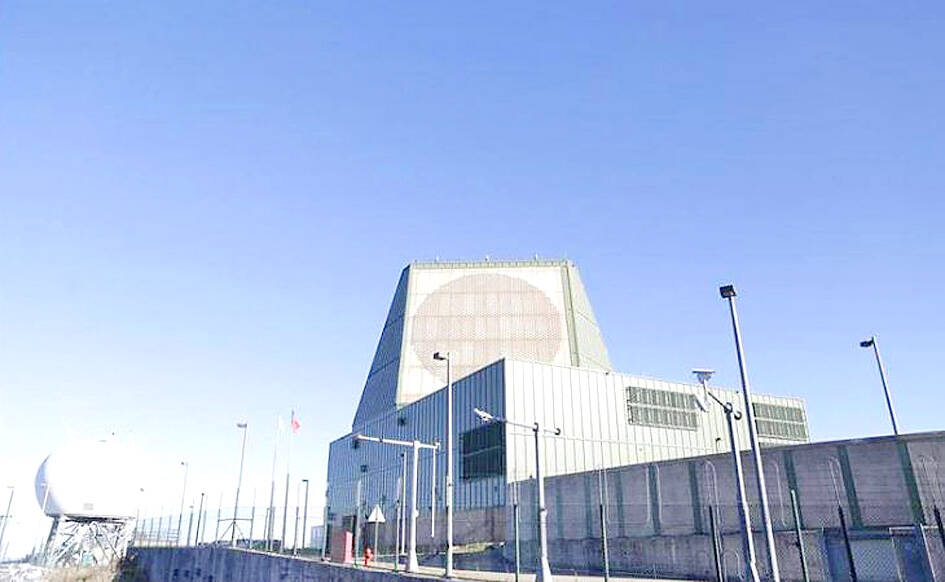Taiwan’s centerpiece of an air defense system, the AN/FPS-115 PAVE PAWS long-range radar in Hsinchu County’s Leshan (樂山), is expected to cost NT$2.39 billion (US$75.01 million) to maintain next year, the Ministry of National Defense’s budget for the next fiscal year showed.
The ultra-high-frequency radar deployed as a fixed installation has a reported maximum range of greater than 5,500km, enough to probe into China’s hinterland, Indochina and the South China Sea, sources said.
The system was operationally activated in February 2013.

Photo: Taipei Times file
The ministry allocated NT$5 million to install an identification system and NT$147 million to maintain the PAVE PAWS’ auxiliary systems in addition to the maintenance of the radar itself, the budget showed.
The radar maintenance budget is only this year’s portion of a much larger continuing technical support program linked to the system that would run over the next four years, it said.
When asked about the costs of the radar, a defense official with knowledge of the matter said on condition of anonymity that the PAVE PAWS system provides Taiwan with sophisticated and highly classified US technology.
US technicians perform the maintenance of proprietary technologies to ensure the system can operate effectively without compromising secrecy, they said, adding that a team of US engineers is stationed in Taiwan for this purpose.
Despite the high maintenance cost associated with it, operating the PAVE PAWS system is necessary for the nation to have the important capability of tracking Chinese missiles, they said.
The Chinese People’s Liberation Army’s recent military exercises, including those that involved firing missiles into Taiwan’s eastern seas, were monitored by the PAVE PAWS system, the official said.
The continuing technical support of the long-range radar is arranged with the US for five-year periods, with the first period starting in 2012, the second in 2017 and the third in last year.
The current technical support increment would cost the nation NT$16.6 billion.

A preclearance service to facilitate entry for people traveling to select airports in Japan would be available from Thursday next week to Feb. 25 at Taiwan Taoyuan International Airport, Taoyuan International Airport Corp (TIAC) said on Tuesday. The service was first made available to Taiwanese travelers throughout the winter vacation of 2024 and during the Lunar New Year holiday. In addition to flights to the Japanese cities of Hakodate, Asahikawa, Akita, Sendai, Niigata, Okayama, Takamatsu, Kumamoto and Kagoshima, the service would be available to travelers to Kobe and Oita. The service can be accessed by passengers of 15 flight routes operated by

Alain Robert, known as the "French Spider-Man," praised Alex Honnold as exceptionally well-prepared after the US climber completed a free solo ascent of Taipei 101 yesterday. Robert said Honnold's ascent of the 508m-tall skyscraper in just more than one-and-a-half hours without using safety ropes or equipment was a remarkable achievement. "This is my life," he said in an interview conducted in French, adding that he liked the feeling of being "on the edge of danger." The 63-year-old Frenchman climbed Taipei 101 using ropes in December 2004, taking about four hours to reach the top. On a one-to-10 scale of difficulty, Robert said Taipei 101

Taiwanese and US defense groups are collaborating to introduce deployable, semi-autonomous manufacturing systems for drones and components in a boost to the nation’s supply chain resilience. Taiwan’s G-Tech Optroelectronics Corp subsidiary GTOC and the US’ Aerkomm Inc on Friday announced an agreement with fellow US-based Firestorm Lab to adopt the latter’s xCell, a technology featuring 3D printers fitted in 6.1m container units. The systems enable aerial platforms and parts to be produced in high volumes from dispersed nodes capable of rapid redeployment, to minimize the risk of enemy strikes and to meet field requirements, they said. Firestorm chief technology officer Ian Muceus said

MORE FALL: An investigation into one of Xi’s key cronies, part of a broader ‘anti-corruption’ drive, indicates that he might have a deep distrust in the military, an expert said China’s latest military purge underscores systemic risks in its shift from collective leadership to sole rule under Chinese President Xi Jinping (習近平), and could disrupt its chain of command and military capabilities, a national security official said yesterday. If decisionmaking within the Chinese Communist Party has become “irrational” under one-man rule, the Taiwan Strait and the regional situation must be approached with extreme caution, given unforeseen risks, they added. The anonymous official made the remarks as China’s Central Military Commission Vice Chairman Zhang Youxia (張又俠) and Joint Staff Department Chief of Staff Liu Zhenli (劉振立) were reportedly being investigated for suspected “serious